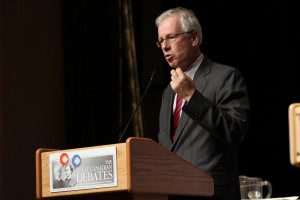Can Quebec unilaterally secede from Canada? NO
In contrast to Daniel Turp’s position on secession, Hon. Stéphane Dion, in an article for the Ottawa Citizen, argues Quebec’s secession from Canada would be unacceptable in a democracy, irresponsible, and practically impossible. Labelled as an unconstitutional move, Dion makes his position clear that Quebec does not have the unilateral right to secede from Canada. See Dion’s article below to find out why.
BY STÉPHANE DION, OTTAWA CITIZEN JUNE 20, 2013
Thursday night at the War Museum, in a debate hosted by the Macdonald-Laurier Institute and moderated by historian Jack Granatstein, former federal Liberal leader Stéphane Dion and former Bloc and PQ member Daniel Turp debated the resolution: The Government of Quebec can decide unilaterally to secede from Canada. For Daniel Turp’s argument, click here.
Whether we are for or against Quebec’s secession, we have to admit that an attempt at unilateral secession — one undertaken without negotiating a constitutional amendment — would be doomed. It would be bad for everyone concerned. It would not lead to independence and it would be very disruptive for all.
And the reason for that is simple: a unilateral attempt to secede would have no legal foundation. It would contravene Canadian law and would have no legal standing in international law. In clarifying this point of law, the Supreme Court of Canada has done everyone a great service. Except for colonial or subjugation situations, international law has no rule allowing a secessionist government to impose secession legally to those who do not want it.
Yet that is exactly what a secessionist government would need if it wanted to act unilaterally: a legal means of forcing everybody to accept a change of country — including those who do not want to.
And there might be many of the latter: it is easily conceivable that faced with the inevitable turmoil that would be caused by a unilateral attempt to secede, millions of Quebecers would refuse to see their country taken away from them outside the rule of law. A secessionist government acting outside the law would have no way to compel obedience and would confront the entire society with dangers that are unacceptable in a democracy.
There is no mandatory rule, no peremptory norm in international law that would allow a secessionist government to bypass Canada’s laws. It would be unconstitutional for a Canadian provincial government to secede unilaterally and to usurp the responsibilities attributed by the Constitution to the federal level of government.
Outside the rule of law, the Parliament and government of Canada could not proceed with the breakup of Canada and put an end to their constitutional obligations toward almost a quarter of the country’s population. But such a breakup would require not only the consent but also the active involvement of the government of Canada, if only for practical reasons.
Ways would have to be found to transfer tens of thousands of public servants from federal departments and crown corporations to the Quebec public service, millions of tax returns, tons of laws and regulations. … The breakup of a modern State like Canada could turn into an administrative nightmare. Such a huge operation could not happen without the assent and active participation of the government of Canada.
This level of participation by the government of Canada would not be secured through a unilateral declaration of independence. On the contrary: not only would unilateral secession be without legal foundation, it would also be a practical impossibility.
To these arguments, secessionist leaders answer that the issue will be resolved through international recognition. This scenario would have foreign states recognizing a Canadian province as an independent country against the will of the government of Canada.
This is an unrealistic scenario that belies the proven, extreme reluctance of states to recognize unilateral secessions, and their past and ongoing practices in that regard. In fact, no state created by unilateral secession has ever been admitted to the United Nations against the declared will of the government of a predecessor state.
An attempt at unilateral secession of Quebec from Canada would be an irresponsible act and would be perceived as such by the international community. Many are the states that fear the impact such an example might have on their own unity. They also worry about the destabilizing effect a series of secessions would have in a world with no less than 3,000 different human groups who claim distinct collective identities.
Far from making secession less onerous, attempting to achieve this objective unilaterally would put it out of reach. However, Quebec’s secession from Canada would be possible if it were done within the law, following the path outlined in the 1998 opinion of the Supreme Court of Canada and the Clarity Act which gives it effect. A separation agreement would have to be duly negotiated within the Canadian constitutional context, on the basis of a clear expression of the will of Quebecers to leave Canada in order to make Quebec an independent State.
The breakup of a modern state such as Canada would be a very difficult goal to attain — and an unreachable one if pursued without clarity and outside the rule of law.
Stéphane Dion is member of Parliament for Saint-Laurent-Cartierville.





